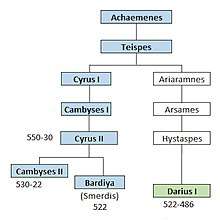Arsames
Arsames (Old Persian: 𐎠𐎼𐏁𐎠𐎶[1] Aršāma,[2] modern Persian:،آرسام، آرشام[3] Arshām, Greek: Ἀρσάμης; – ca. 520 BC) was the son of Ariaramnes and perhaps briefly the king of Persia during the Achaemenid dynasty, but he gave up the throne and declared loyalty to Cyrus II of Persia. After this, Arsames most likely retired to his family estate in the Persian heartland of Parsa, and lived out the rest of his long years there peacefully, though he may nominally have exercised the duties of a "lesser king" under the authority of the "Great King". In an inscription allegedly found in Hamadan[4] he is called "king of Persia", but some scholars believe it is a fraud, either modern or ancient. Another attestation of his reign is the Behistun Inscription, where his grandson Darius I lists him among his royal forebears and counts him among the eight kings who preceded him.

Arsames was the father of Hystaspes, satrap of Parthia, of Pharnaces, satrap of Phrygia and of Megabates, general. Arsames would live to see his grandson, Darius I, become the Great King of the Persian Empire, though he would die during his reign. In any case, he would seem to have been one of the longest-surviving royals anywhere in the world at that time, possibly living well into his nineties.
The name translates to "having a hero's strength".[5]
References
- Akbarzadeh (2006), page 56
- Kent (2005), page 393
- Kent (2005), page 392
- The inscription is known among Old Persian scholars by the code AsH.
- "ARŠĀMA – Encyclopaedia Iranica". www.iranicaonline.org. Retrieved 2020-04-09.
Bibliography
- Akbarzadeh, D.; A. Yahyanezhad (2006). The Behistun Inscriptions (Old Persian Texts) (in Persian). Khaneye-Farhikhtagan-e Honarhaye Sonati. ISBN 964-8499-05-5.
- Kent, Ronald Grubb (2005). Old Persian: Grammar, Text, Glossary (in Persian). translated into Persian by S. Oryan. p. 393. ISBN 964-421-045-X.
- A. Sh. Shahbazi: "Arsama", in Encyclopaedia Iranica.
External links
Arsames Born: ?? Died: c. 520 BC | ||
| Preceded by Ariamenes |
King of Persia | Succeeded by Cyrus II |